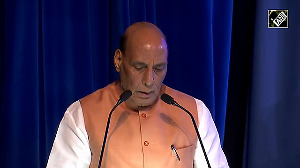When selecting a liquid fund, stick to schemes with an AUM of above Rs 1,000 crore, says Sanjay Kumar Singh.
Illustration: Dominic Xavier/Rediff.com

Recently, the Securities and Exchange Board of India, Sebi, took two key decisions on mutual funds: It allowed instant access facility in liquid funds, and also permitted investments in mutual funds through e-wallets.
While instant redemption could lead to investors shifting more money from savings accounts into liquid funds, it may be a while before payments through e-wallets take off.
From t+1 redemption in liquid funds earlier, you will now be able to get your money almost instantly.
"Investors can get the amount credited in their bank accounts within 30 minutes, and often immediately. They should consider liquid funds instead of savings accounts for keeping their idle cash," says Sundeep Sikka, executive director and chief executive officer, Reliance Mutual Fund.
Sebi has specified that instant redemption should be offered only in liquid schemes. A few asset management companies, AMCs, were offering it in ultra-short term schemes.
"Some fund houses will have to make that change," says Sikka.
Several fund houses were also offering instant redemption in money market schemes up to the lower of Rs 200,000 or 90 per cent of invested amount.
Sebi has allowed instant redemption up to the lower of Rs 50,000 or 90 per cent of folio value. Fund houses will have to lower their redemption limit now.
Returns from liquid funds are in the range of 6.25 to 6.50 per cent annualised, while savings accounts of most banks pay 4 per cent interest (a few pay 5 to 6 per cent).
As for taxation, short-term capital gains from liquid funds and interest from savings accounts are both taxed at the marginal income tax rate.
However, one advantage that savings accounts enjoy is that under Section 80TTA, investors can avail of a deduction of up to Rs 10,000 on interest income.
When selecting a liquid fund, stick to schemes with an AUM (assets under management) of above Rs 1,000 crore (Rs 10 billion).
Expense ratio is another key criterion.
"Select funds that have the lowest possible expense ratios but are still in the top 10 per cent of the returns generated over six-month, one-year, and three-year horizons," says Kunal Bajaj, founder and chief executive officer, Clearfunds.com, a Sebi-registered investment advisor.
Avoid investing in a fund that generates top-quartile returns despite having a high expense ratio.
"The fund may be taking on higher credit risk," he says.
Also, buy a direct scheme in this category.
Sebi has also allowed investors to invest up to Rs 50,000 per mutual fund per financial year through e-wallets.
"Even people with savings of Rs 10,000 to rs 20,000 will be able to put that money in a liquid fund, where it will earn them a higher return," says Sunil Kulkarni, joint managing director, Oxigen Services, a mobile wallet provider.
However, it may be some time before payments through e-wallets become a reality due to execution-related challenges.
One condition is that the money that gets invested in mutual funds shouldn't have a credit card as the source of payment.
"Wallet companies will have to build this identification feature for source of wallet recharge to avoid credit card money coming into mutual funds," says Santosh Navlani, senior vice-president, DSP BlackRock Mutual Fund.
The regulator has stipulated that investments made through e-wallets can only be redeemed into a bank account. This could prevent fund houses from accessing a new market.
"Had redemption been allowed into the e-wallet itself, mutual funds could have targeted individuals who use a mobile wallet but don't have a bank account. People who already use both an e-wallet and a bank account are anyway accustomed to making online payments and are unlikely to adopt payment through e-wallets, given the Rs 50,000 limit," says Navlani.








 © 2025
© 2025